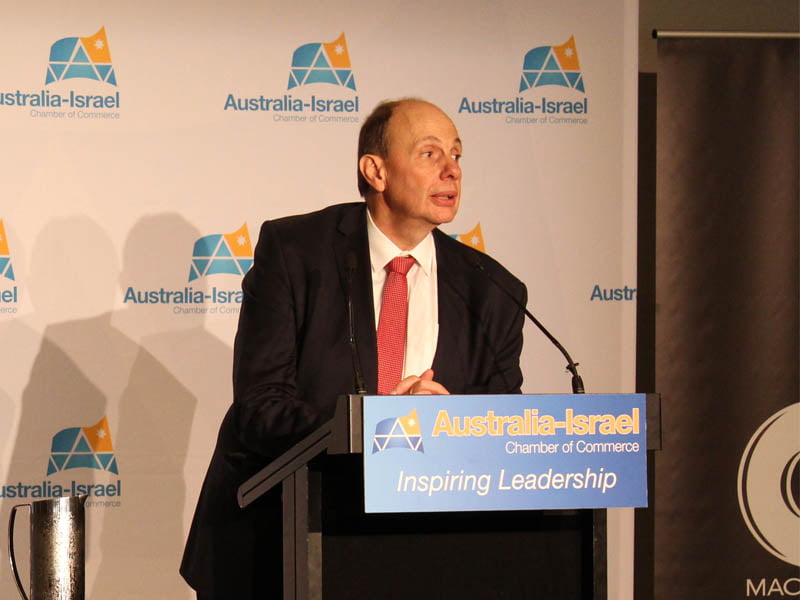It’s tax cuts that big business wants, not more rhetoric on innovation, and on Friday the PM delivered – at least for smaller big business.
As the Prime Minister Malcolm Turnbull and Finance Minister Mathias Cormann were negotiating business tax cuts with the Senate in Canberra, Business Council of Australia president Grant King delivered his inaugural public address in Sydney.
Speaking at the Australia-Israel Chamber of Commerce Mr King reiterated the BCA’s call for an across the board cut in the corporate tax rate – but acknowledged it anticipated a compromise.

And compromise is what was the Turnbull Government delivered just a few hours later.
As a result of a deal with Senator Nick Xenophon, tax cuts will be delivered to companies with revenues of up to $50 million with progressive reductions until the rate is 25 per cent in 2026/7.
The startup and emerging tech sector will be among the first beneficiaries with companies with revenues of up to $10 million having their corporate tax rate cut starting this year.
BCA chief executive Jennifer Westacott welcomed the tax cuts which she said were an “historic step towards rebooting Australia’s international competitiveness and prosperity.”
But Mr King said during his address to the Australia-Israel Chamber of Commerce on Friday, that “the path to prosperity is not easy” and relies on multiple factors – tax is a key element, but so is innovation and workplace flexibility.
“Three quarters of our income growth is driven by productivity, a quarter by terms of trade – and a quarter of productivity is driven by investment,” he said, including investment in innovation.
While most of his address was focused on the need for wholesale systemic reform, Mr King did acknowledge the role that innovation played.
“Business is required constantly to innovate to survive and to change,” he said. “Business leaders should live in the future. If we are laggards and not leaders, our businesses will wither and die and so will our country.”
There is, however, evidence of a gap emerging between the rhetoric and the reality.
The AICC also released on Friday its latest Innovation Index. Developed in association with Sky Business, the index is intended to take the temperature on innovation among Australian business.
The latest report, based on a poll of 100 companies in March, revealed that seven out of ten executives described their work environment as quite or extremely supportive of innovation. It’s a significant decline on the last quarterly survey when nine out of ten executives said their business was pro innovation.
This is despite industry disruption from technology and innovation being nominated as the number one challenge, along with market pressure and forecasting, currently facing Australian businesses.
Asked about that rapid decline in innovation appetite over the last quarter Mr Grant said: “I think Australian business, especially when you look at the largest enterprises – and take off resources and banking because they are driving innovation every day – Australian business are great adopters and adapters.
“Innovation more broadly is a very difficult thing. It is very hard to make innovation spontaneously occur. There is a lot to get right in the economy first – the education system, and incentives and rewards [for example, and] if you have got a flexible workforce people can benefit from innovation.”
With regard to workplace flexibility, the BCA is still clearly reeling from the public backlash regarding the drop in weekend penalty rates.
“To have a rancorous debate about weekend penalty rates when the decision was made by an independent authority sends a bad signal about the need to achieve flexibility in the economy.”
There could be more rancorous debate ahead however, as Mr King said that the BCA would continue to advocate for the removal of barriers to job creation in order to seed more flexible workplaces.
“We are competing with companies working in a world where there is no night and no day … we have to have workplaces flexible enough.”
But not everyone will find it easy to secure work in this brave new world of flexible and increasingly automated workplaces.
The AICC Innovation Index has for the first time explored the likely impact of innovation on Australian jobs.
While two in five executives believed innovation would increase the number of jobs – a quarter expected that innovation including new technology would reduce the need for some staff.
It points to ongoing workplace disruption where only some of the workforce will benefit, with other workers being displaced. The issue has already been raised as one that government and industry needs to urgently consider.
When asked how Australia could lift its innovation game, 39 per cent of survey respondents opted for more cohesive collaboration across industry, government and academics; 24 per cent called for more focus on innovation – for example coding – as part of early education; and 23 per cent plumped for tax benefits for internal investment.
Just 14 per cent said that more specific investment opportunities from government were the key.
Do you know more? Contact James Riley via Email.

